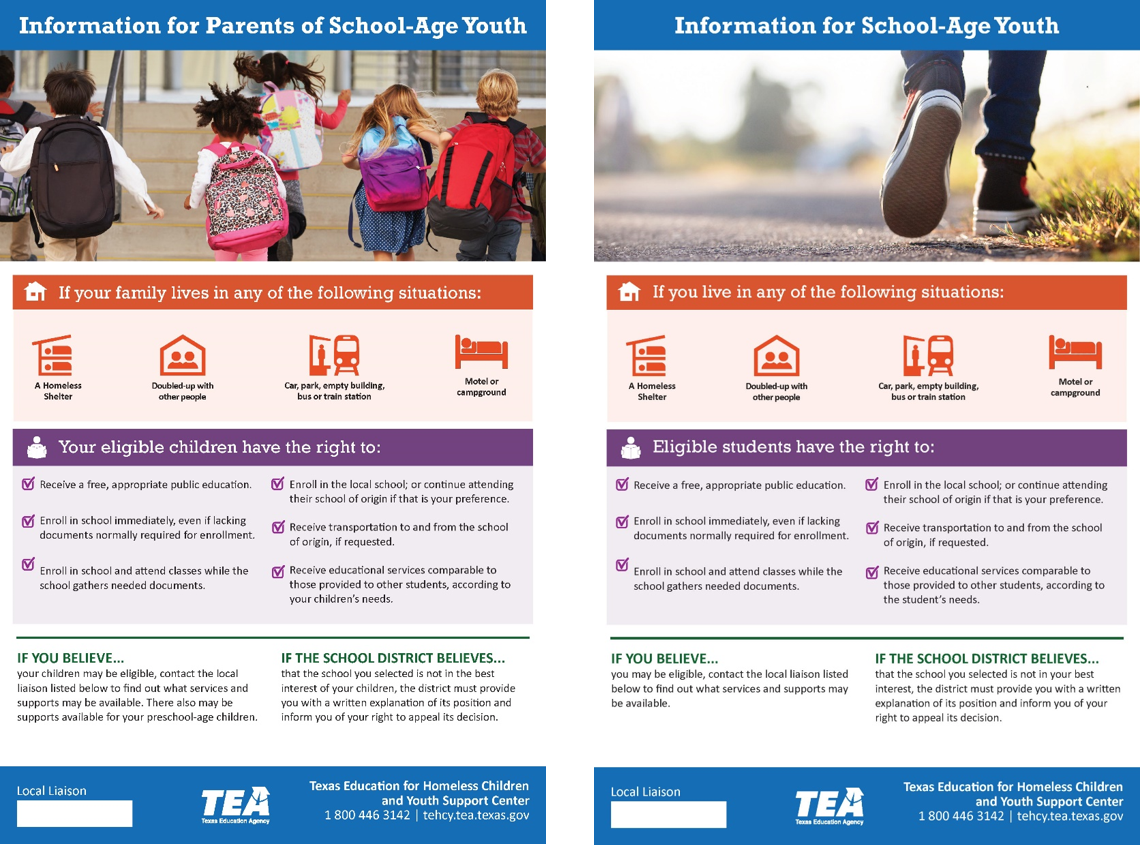Homeless Education
Burnet CISD McKinney-Vento Services
The McKinney-Vento Act addresses challenges that students experiencing homelessness or housing instability face with enrolling, attending, and ultimately succeeding in school.
Burnet CISD McKinney-Vento Liaison staff will assist families and students who are enrolling in our schools to address barriers to registration and education and provide students the opportunity to participate in school.
Our services are intended for helping students to enroll, attend, and receive the educational resources that they need to experience school success. We can help parents and caretakers ensure that students have the same educational opportunities as other students enrolled in the school district.
We support every school in Burnet CISD.
See our McKinney - Vento Brochure below for more information.
Or contact Mendy Barrow - Burnet CISD McKinney-Vento Liaison
512-715-5493 - [email protected]
Region 13 McKinney-Vento Team - Cheryl Meyers
512-919-5462 - [email protected]
https://esc13.net/special-populations/homeless-education
Weakday Ministries - Offers clothing, toiletries, and other needs at no cost. Go to www.weakdayministries.com
and fill out the form and submit it.
[email protected] Donna Shaw - 512-756-8796
Burnet County Child Welfare Board - can help with clothing, school supplies, etc.
His Hands Ministry - Clothing Assistance - fill out form here
Highland Lakes Crisis Network
The Highland Lakes Crisis Network is a network of churches meeting the physical, emotional and spiritual needs of our neighbors during times of crisis and disaster.
Burnet County Hunger Alliance
BCHA helps coordinate and direct people to existing resources and find gaps in service with the goal being three healthy meals daily to anyone in Burnet County who needs them.
Students Experiencing Homelessness (Texas Health and Human Services)
211 Texas is a free, anonymous social service hotline available 24 hours a day, 7 days a week, 365 days a year.
OR Call 211 (877-541-7905)
Unaccompanied Homeless Youth and their Right to Attend College
211 Texas - Helpful links for housing, employment, food/nutrition
Find Help - Financial assistance, food pantries, medical care, and other free or reduced-cost
Federal Financial Aid Information
April 14, 2023 Update on FAFSA Guidance for Homeless Youth
ED Issues New FAFSA Guidance
for Homeless Youth
|
|
On Friday, April 14th, the U.S. Department of Education (ED) issued new policy guidance on financial aid determinations for unaccompanied youth experiencing homelessness, and unaccompanied youth who are self-supporting and at risk of homelessness. ED’s guidance summarizes new federal financial aid processes that are in effect now, and outlines changes that will go into effect with the 2024-2025 Free Application for Federal Student Aid (FAFSA).
SchoolHouse Connection applauds the release of this new federal guidance, and urges youth, school district homeless liaisons, state homeless education coordinators, homeless service providers, college access programs, and financial aid administrators to review it and help disseminate it to partners and colleagues.
Specifically, the guidance:
- Clarifies that regardless of their age, applicants who are unaccompanied and homeless, or self-supporting and at risk of being homeless, qualify for a homeless youth determination and will be considered independent students on the FAFSA.
- States that the definitions of “homeless” and “unaccompanied” are the same as the ones in the education subtitle of the McKinney-Vento Act. ED’s Application and Verification Guide provides more information on definitions, and emphasizes that the definition of homelessness is broader than just living “on the street.”
- Includes definitions for “at risk of homelessness” and “self-supporting.”
- Describes the processes by which youth who are determined to be “unaccompanied youth experiencing homelessness,” or “unaccompanied, self-supporting, and at risk of homelessness,” will have their status as independent students carried over into subsequent award years if their circumstances have not changed and they are enrolled at the same institution.
- Describes the broader list of entities who are now authorized to make determinations of unaccompanied youth’s status, and states that if a student has received a documented determination from one of these authorities, the institution must not request additional documentation, proof, or statements, unless it has conflicting information about the student’s status.
- States that if a student indicates that they are an unaccompanied homeless youth—or unaccompanied and self-supporting youth at-risk of homelessness—and the student is unable to provide documentation from at least one of the authorized entities, financial aid administrators (FAA) must review the student’s circumstances and make the determination themselves without regard to the reasons that a student is homeless/unaccompanied. In these situations, FAAs must make a case-by-case decision that is based upon a written statement from, or a documented interview with, the student.
- Encourages FAAs to contact the local homeless liaison in their school district if they are uncertain how to make the homeless determination, but emphasizes that FAAs must still make the determination.
- Reminds FAAs that a student may be considered homeless if the student had to flee an abusive or threatening home environment, or had other unusual circumstances that resulted in the student not having a safe, stable place to live, even if the parent(s) would otherwise provide housing.
- Emphasizes that in all situations, institutions must be able to demonstrate that their policies and procedures for reviewing and making homeless youth determinations are compliant with statutory requirements.
- States that starting with the 2023-24 Award Year, institutions must review all requests for a determination of independence (including homeless youth) as quickly as possible, and as early as the year before the applicable award year, but no later than 60 days after the student enrolls.
|



